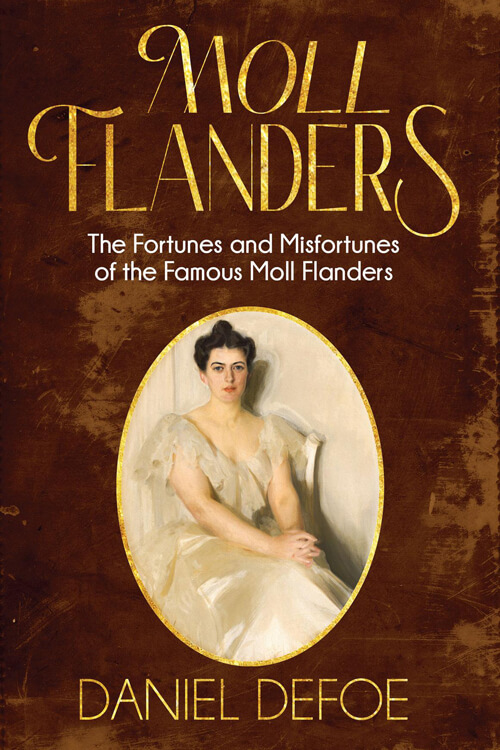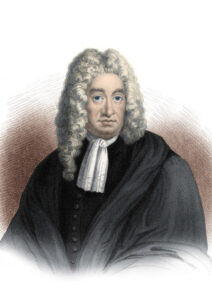
Moll Flanders The Fortunes & Misfortunes of the Famous Moll Flanders
The pen employed in finishing her story and making it what you now see it to be has had little difficulty to put it into a dress fit to be seen and to make it speak language fit to be read. When a woman debauched from her youth, nay, even being the offspring of debauchery and vice, comes to give an account of all her vicious practices, and even to descend to the particular occasions and circumstances by which she ran through in threescore years, an author must be hard put to it wrap it up so clean as not to give room, especially for vicious readers, to turn it to his disadvantage.
All possible care, however, has been taken to give no lewd ideas, no immodest turns in the new dressing up of this story; no, not to the worst parts of her expressions. To this purpose, some of the vicious part of her life, which could not be modestly told, is quite left out, and several other parts are very much shortened. What is left ’tis hoped will not offend the chastest reader or the modest hearer; and as the best use is made even of the worst story, the moral ’tis hoped will keep the reader serious, even where the story might incline him to be otherwise. To give the history of a wicked life repented of, necessarily requires that the wicked part should be made as wicked as the real history of it will bear, to illustrate and give beauty to the penitent part, which is certainly the best and brightest, if related with equal spirit and life.
It is suggested there cannot be the same life, the same brightness and beauty, in relating the penitent part as is in the criminal part. If there is any truth in that suggestion, I must be allowed to say ’tis because there is not the same taste and relish in the reading, and indeed it is so true that the difference lies not in the real worth of the subject so much as in the gust and palate of the reader.
But as this work is chiefly recommended to those who know how to read it, and how to make the good uses of it which the story all along recommends to them, so it is to be hoped that such readers will be more pleased with the moral than the fable, with the application than with the relation, and with the end of the writer than with the life of the person written of.
There is in this story an abundance of delightful incidents, and all of them are usefully applied. There is an agreeable turn artfully given them in the relating, that naturally instructs the reader, either one way or another. The first part of her lewd life with the young gentleman at Colchester has so many happy turns given it to expose the crime and warn all whose circumstances are adapted to it, of the ruinous end of such things, and the foolish, thoughtless, and abhorred conduct of both the parties, that it abundantly atones for all the lively description she gives of her folly and wickedness.
Read or download Book
Daniel Defoe
Daniel Defoe (1660 – 24 April 1731) was an English novelist, journalist, merchant, pamphleteer and spy. He is most famous for his novel Robinson Crusoe, published in 1719, which is claimed to be second only to the Bible in its number of translations. He has been seen as one of the earliest proponents of the English novel and helped to popularise the form in Britain with others such as Aphra Behn and Samuel Richardson. Defoe wrote many political tracts, was often in trouble with the authorities, and spent a period in prison. Intellectuals and political leaders paid attention to his fresh ideas and sometimes consulted him.
Defoe was a prolific and versatile writer, producing more than three hundred works—books, pamphlets, and journals—on diverse topics, including politics, crime, religion, marriage, psychology, and the supernatural. He was also a pioneer of business journalism and economic journalism.
Early life
Daniel Foe (his original name) was probably born in Fore Street in the parish of St Giles Cripplegate, London. Defoe later added the aristocratic-sounding “De” to his name, and on occasion made the false claim of descent from a family named De Beau Faux. “De” is also a common prefix in Flemish surnames. His birthdate and birthplace are uncertain, and sources offer dates from 1659 to 1662, with the summer or early autumn of 1660 considered the most likely. His father, James Foe, was a prosperous tallow chandler of probable Flemish descent, and a member of the Worshipful Company of Butchers. In Defoe’s early childhood, he lived through several significant historical events: in 1665, seventy thousand were killed by the Great Plague of London, and the next year, the Great Fire of London left only Defoe’s and two other houses standing in his neighborhood. In 1667, when he was probably about seven, a Dutch fleet sailed up the Medway via the River Thames and attacked the town of Chatham in the raid on the Medway. His mother, Alice, had died by the time he was about ten.
Education
Defoe was educated at the Rev. James Fisher’s boarding school in Pixham Lane in Dorking, Surrey. His parents were Presbyterian dissenters, and around the age of 14, he was sent to Charles Morton’s dissenting academy at Newington Green, then a village just north of London, where he is believed to have attended the Dissenting church there. He lived on Church Street, Stoke Newington, at what is now nos. 95–103. During this period, the English government persecuted those who chose to worship outside the established Church of England.






